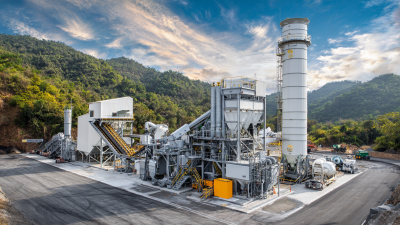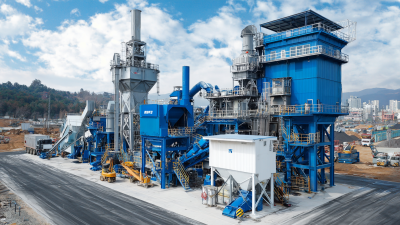What is the Role of Asphalt Plant in Modern Construction
In the modern construction landscape, the Asphalt Plant plays a pivotal role,
serving as a crucial component in the production of high-quality asphalt
for road systems, pavements, and various infrastructure projects. As urbanization accelerates and the demand for
durable, sustainable surfaces increases, understanding how to effectively operate an
Asphalt Plant becomes essential for construction professionals.
This guide aims to provide insights into the functioning of Asphalt Plants, the
technology employed, and the best practices for optimizing their use
in construction processes. By delving into the significance of Asphalt Plants, we can appreciate their contribution
to enhancing the efficiency, safety, and longevity of construction projects,
ultimately impacting the quality of the built environment we inhabit.
Understanding the Functionality of Asphalt Plants in Construction Projects
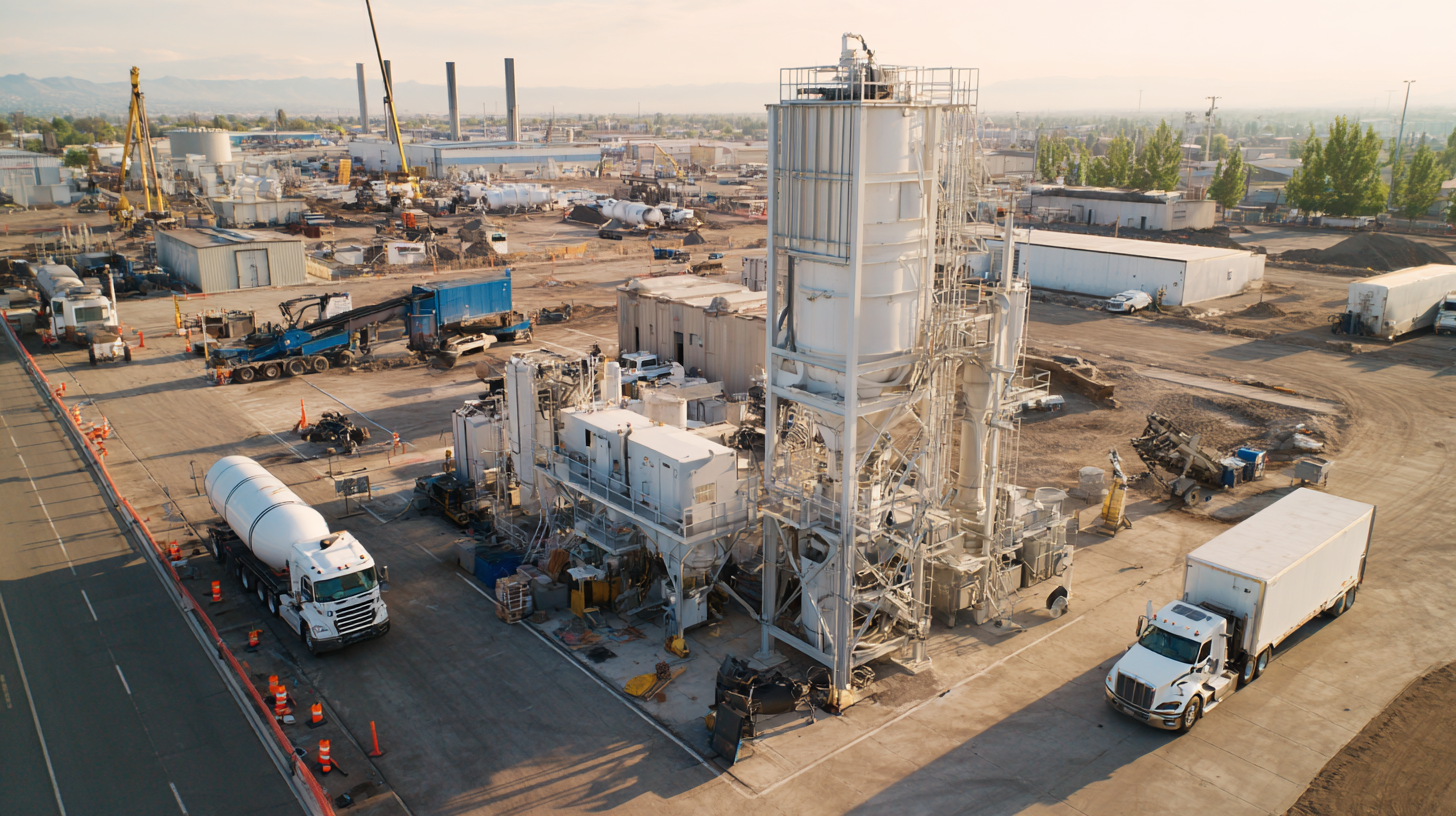 Asphalt plants play a crucial role in modern construction by providing essential materials for road building and other infrastructure projects. They are responsible for producing high-quality asphalt mixtures that ensure durability and performance. According to the National Asphalt Pavement Association, approximately 90% of the paved roads in the United States are surfaced with asphalt, highlighting its significance in the construction industry. This material not only improves the longevity of roadways but also enhances safety and comfort for drivers.
Asphalt plants play a crucial role in modern construction by providing essential materials for road building and other infrastructure projects. They are responsible for producing high-quality asphalt mixtures that ensure durability and performance. According to the National Asphalt Pavement Association, approximately 90% of the paved roads in the United States are surfaced with asphalt, highlighting its significance in the construction industry. This material not only improves the longevity of roadways but also enhances safety and comfort for drivers.
The functionality of asphalt plants involves a consistent and efficient process of heating, mixing, and storing asphalt materials. Advanced technologies enable these plants to minimize environmental impact while maximizing production efficiency. For instance, the use of recycled asphalt pavement (RAP) is a growing trend, with an estimated 99 million tons of RAP reused in 2020 alone, according to the Federal Highway Administration. Utilizing RAP not only conserves resources but also significantly reduces production costs, making construction projects more sustainable and economically viable.
Tips: When selecting an asphalt plant for a project, consider its capacity and technological advancements. Ensure the facility meets local environmental regulations to avoid potential compliance issues. Moreover, evaluating the plant's ability to use recycled materials can contribute to sustainable construction practices, ultimately benefiting both the budget and the environment.
Key Benefits of Using Asphalt in Modern Infrastructure Development
Asphalt plays a pivotal role in modern infrastructure development, offering several key benefits that enhance the durability and efficiency of construction projects. According to the Federal Highway Administration, asphalt pavement comprises approximately 94% of all paved roads in the United States, highlighting its widespread application in road construction. The material's ability to withstand heavy traffic loads and environmental elements makes it an ideal choice for both urban and rural roadways. Furthermore, the National Asphalt Pavement Association (NAPA) reports that using asphalt can lower construction costs by 30% compared to alternative materials, providing economic advantages alongside structural resilience.
Another significant benefit of asphalt is its sustainability. The process of recycling asphalt is well-established, with NAPA estimating that over 100 million tons of reclaimed asphalt pavement (RAP) are reused each year. This not only reduces waste but also conserves natural resources, aligning with the growing emphasis on sustainable development in construction. Additionally, asphalt's smooth surface contributes to improved fuel efficiency for vehicles, ultimately leading to lower carbon emissions. These advantages make asphalt a crucial component in the development of modern infrastructure, ensuring projects meet both performance and environmental standards.
Exploring the Environmental Impact of Asphalt Plant Operations
The role of asphalt plants in modern construction is pivotal, but their environmental impact raises important concerns. According to the National Asphalt Pavement Association, asphalt recycling has become a standard practice, with about 99% of asphalt pavement being reclaimed and reused in new projects. However, the operations of asphalt plants can produce emissions that affect air quality. A report by the Environmental Protection Agency highlights that these plants can emit volatile organic compounds (VOCs) and particulate matter, which are known to contribute to respiratory issues and other health problems in nearby communities.
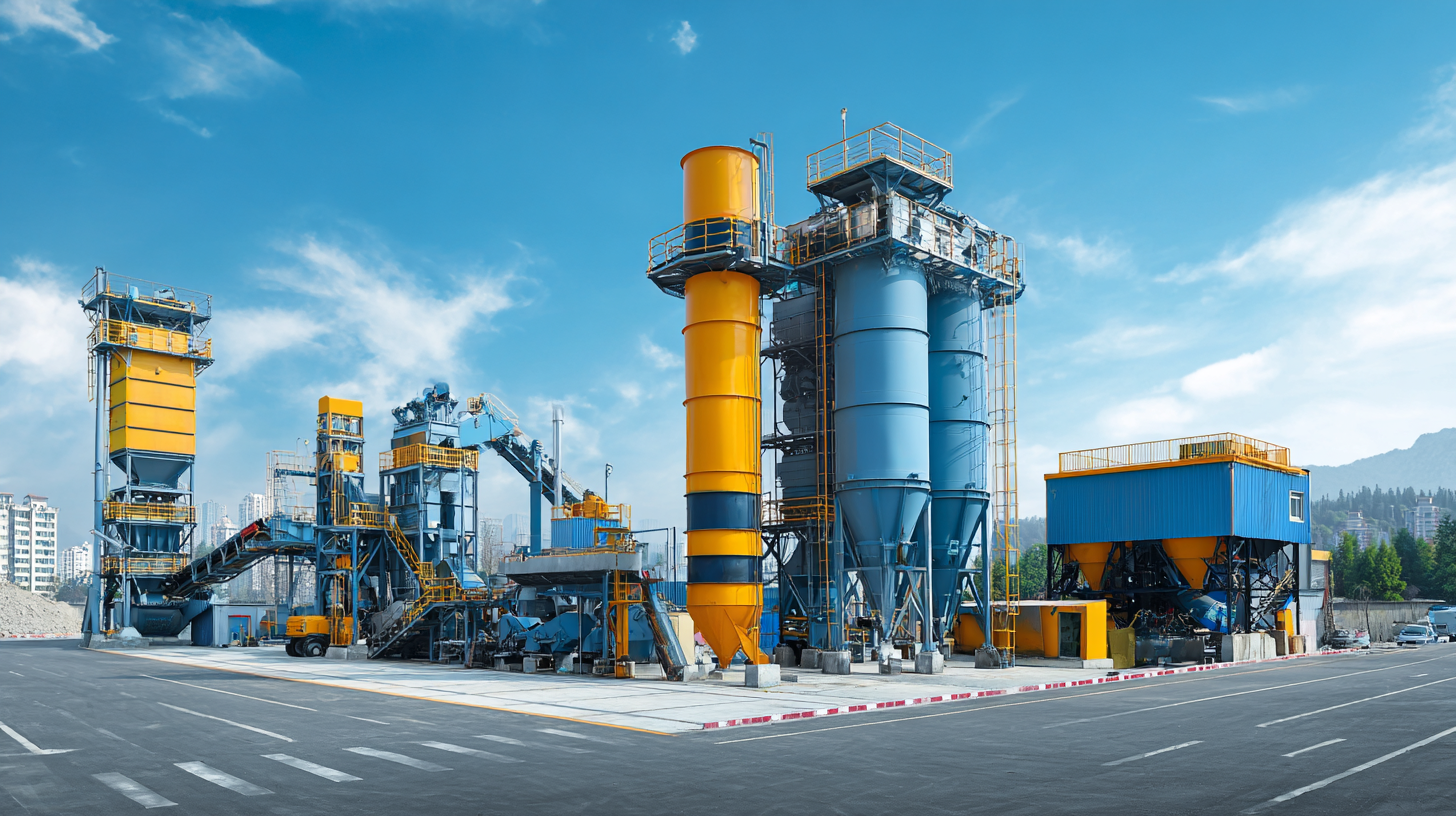
Furthermore, the water management practices at asphalt plants are critical in minimizing their environmental footprint. The industry has made strides in adopting technologies that reduce the risk of runoff contamination. The Federal Highway Administration notes that the installation of closed-loop water systems can significantly decrease water pollution risks associated with plant operations. By integrating sustainable practices, asphalt plants not only support the construction industry but also work towards mitigating their environmental impact, ensuring they contribute positively to both infrastructure and community health.
Innovations in Asphalt Technology and Their Role in Construction Efficiency
The role of asphalt plants in modern construction is increasingly pivotal, especially with the advent of innovative asphalt technologies that significantly enhance construction efficiency. According to a report by the National Asphalt Pavement Association, approximately 90% of the roads in the United States are paved with asphalt, highlighting its dominance and importance in infrastructure development. The integration of recycled materials, such as reclaimed asphalt pavement (RAP), into new asphalt mixes has revolutionized the industry. Research indicates that using RAP can reduce production costs by up to 20% while simultaneously decreasing the environmental footprint associated with new material extraction.
Moreover, advancements in warm mix asphalt technology allow for production at lower temperatures, which not only cuts down on energy consumption—estimates suggest a reduction of up to 30% in energy usage—but also minimizes harmful emissions during the paving process. A study from the Federal Highway Administration shows that warm mix asphalt can extend the lifespan of pavements by reducing thermal cracking. These innovations in asphalt technology are driving efficiency in construction, providing durable, cost-effective, and environmentally friendly solutions that enable the industry to meet current and future demands while sustaining quality.
The Importance of Quality Control in Asphalt Production for Construction Success
The asphalt plant plays a crucial role in modern construction, primarily through its capacity to produce high-quality asphalt for various applications. Central to this process is the importance of quality control, which ensures that the asphalt meets the required specifications for durability and performance. Effective quality control measures include rigorous testing of raw materials, monitoring production processes, and consistent evaluation of the final product. By adhering to strict standards, asphalt plants can prevent defects that might lead to structural failures or increased maintenance costs down the line.
Moreover, quality control in asphalt production significantly contributes to the success of construction projects. It not only guarantees that the materials used can withstand varying environmental conditions but also enhances the longevity of the pavement. With proper quality assurance processes in place, project managers can be confident in the integrity of the asphalt, ultimately fostering trust among stakeholders and helping to secure future contracts. Thus, the role of asphalt plants is not only about production but also about ensuring that every batch of asphalt is crafted with the highest level of quality, essential for the sustainability of modern infrastructure.
What is the Role of Asphalt Plant in Modern Construction - The Importance of Quality Control in Asphalt Production for Construction Success
| Asphalt Type |
Mix Design Approval |
Temperature Control (°C) |
Quality Control Tests |
Recycling Rate (%) |
| Dense Graded Asphalt |
Yes |
150 - 160 |
Marshall Stability, Flow |
20 |
| Stone Mastic Asphalt |
Yes |
160 - 170 |
Dynamic Modulus, Gyratory Compaction |
30 |
| Warm Mix Asphalt |
Yes |
120 - 140 |
Skid Resistance, Indirect Tensile Strength |
50 |
| Porous Asphalt |
Yes |
140 - 150 |
Air Voids, Permeability |
15 |

Home
About Us
Products
 Concrete Mixing Plant
Concrete Mixing Plant
 HZS Series Belt Concrete Mixing Plant
HZS Series Belt Concrete Mixing Plant
 HZS Series Bucket-Lifting Type Container Concrete Mixing Plant
HZS Series Bucket-Lifting Type Container Concrete Mixing Plant
 HZS60 Mobile Concrete Mixing Plant
HZS60 Mobile Concrete Mixing Plant
 HZS Series Bucket-Lifting Type Concrete Mixing Plant
HZS Series Bucket-Lifting Type Concrete Mixing Plant
 HZS Series Mobile Concrete Mixing Plant
HZS Series Mobile Concrete Mixing Plant
 HZS Series Top-Mounted Concrete Mixing plant
HZS Series Top-Mounted Concrete Mixing plant
 HZS Series Semi-Top Mounted Concrete Mixing Plant
HZS Series Semi-Top Mounted Concrete Mixing Plant
 Stabilized Soil Mixing Plant
Stabilized Soil Mixing Plant
 Asphalt Mixing Plant
Asphalt Mixing Plant
 Sand & Gravel Crushing and Screening Plant
Sand & Gravel Crushing and Screening Plant
 RTPF350DS Crawler Mobile Impact Crushing Plant
RTPF350DS Crawler Mobile Impact Crushing Plant
 RT116JH Crawler Mobile Jaw Crushing Plant
RT116JH Crawler Mobile Jaw Crushing Plant
 RT116JE Crawler Mobile Jaw Crushing Plant
RT116JE Crawler Mobile Jaw Crushing Plant
 RT300CE Crawler Mobile Cone Crushing Plant
RT300CE Crawler Mobile Cone Crushing Plant
 RT300CH Crawler Mobile Cone Crushing Plant
RT300CH Crawler Mobile Cone Crushing Plant
 RT5015H Mobile Scalping Screen
RT5015H Mobile Scalping Screen
 RT315VSIE Crawler Mobile Sand Maker
RT315VSIE Crawler Mobile Sand Maker
 RT3YK6020 Crawler Mobile Screening Plant
RT3YK6020 Crawler Mobile Screening Plant
 RT3YK6020M Modular Screening Plant
RT3YK6020M Modular Screening Plant
 RTF260M Modular Counterattack Crushing and Screening Integrated Machine
RTF260M Modular Counterattack Crushing and Screening Integrated Machine
 RTF350M Modular Impact Crushing Plant
RTF350M Modular Impact Crushing Plant
 RTF450M Modular Impact Crushing Plant
RTF450M Modular Impact Crushing Plant
 Construction Waste Resourceful Treatment Line
Construction Waste Resourceful Treatment Line
Performances
Video
News
Blog
Contact Us
 WDB Series Foundation-Free Stability Soil Mixing Plant
WDB Series Foundation-Free Stability Soil Mixing Plant LCB Series Emulsified Asphalt Cold Regeneration Secondary Mixing Plant
LCB Series Emulsified Asphalt Cold Regeneration Secondary Mixing Plant LB Series Asphalt Mixing Plant
LB Series Asphalt Mixing Plant LBR Series Integrated Asphalt Mixing Plant
LBR Series Integrated Asphalt Mixing Plant LBRN Series Counterflow Integral Asphalt Mixing Plant
LBRN Series Counterflow Integral Asphalt Mixing Plant RZS Series Asphalt Mixing Plant
RZS Series Asphalt Mixing Plant RTZS120 Series RAP Crushing & Screening Plant
RTZS120 Series RAP Crushing & Screening Plant Construction Waste Resourceful Treatment Line
Construction Waste Resourceful Treatment Line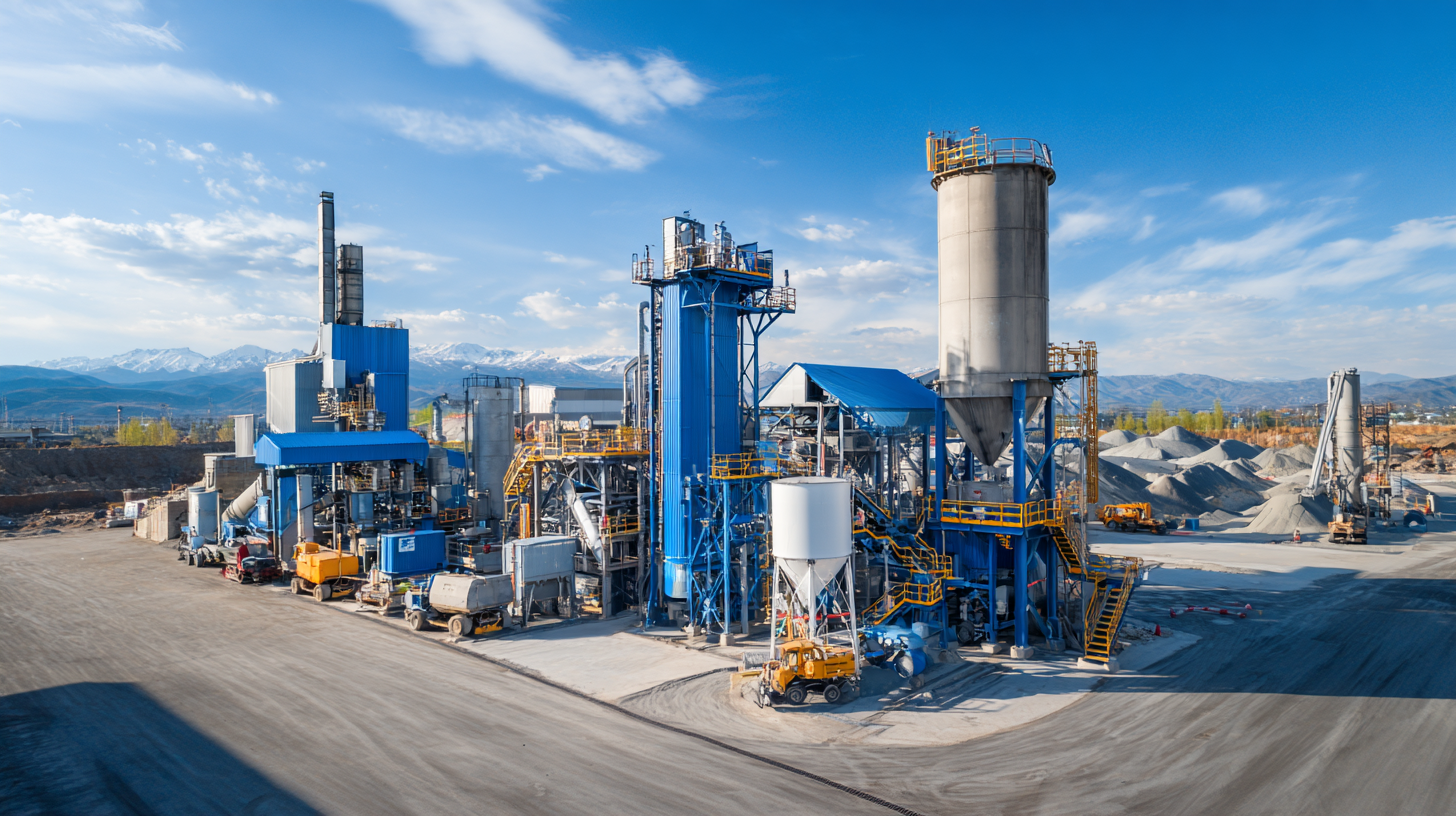
 Asphalt plants play a crucial role in modern construction by providing essential materials for road building and other infrastructure projects. They are responsible for producing high-quality asphalt mixtures that ensure durability and performance. According to the National Asphalt Pavement Association, approximately 90% of the paved roads in the United States are surfaced with asphalt, highlighting its significance in the construction industry. This material not only improves the longevity of roadways but also enhances safety and comfort for drivers.
Asphalt plants play a crucial role in modern construction by providing essential materials for road building and other infrastructure projects. They are responsible for producing high-quality asphalt mixtures that ensure durability and performance. According to the National Asphalt Pavement Association, approximately 90% of the paved roads in the United States are surfaced with asphalt, highlighting its significance in the construction industry. This material not only improves the longevity of roadways but also enhances safety and comfort for drivers.
